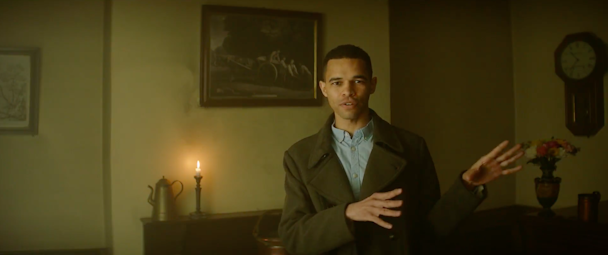What’s it like to be a Nationwide poet?
Nationwide’s decision to tell the stories of its earliest customers through spoken word has launched its latest laureate – the Birmingham-based Stephen Morrison-Burke – into the public eye. The Drum caught up with the wordsmith to learn how he approached the commercial brief, and hear how sees the relationship between advertising and poetry evolving.

Stephen Morrison-Burke features in Nationwide's latest campaign
When did Nationwide’s agency, VCCP, approach you about featuring in the Voices campaign?
I got an email in February. I’d seen the previous Voices adverts – not all of them, but a few – and I wasn’t sure at first. I didn’t know what it was going to be about or whether it would conflict with my own work and the things I like to talk about. But when I read the brief I was excited by it.
Firstly it was about Birmingham and a working-class story, which is what I’ve been writing about for the last seven or eight years. It was a long brief, all about how Nationwide started, but there was a large emphasis on the fact that people couldn’t distinguish between a bank and a building society. They’d had trouble trying to lineate that before, trying to express the difference between them.
They wanted me to tell this story and explain, if I could, how they differ. It was a lot of brief to fit into 45 seconds of poem. I had to try and find a way of going back to the past, talking about it, but also trying to highlight the fact that that’s still the case today and [Nationwide] live by the same ethos. I chip away at things for a very long time: I write over and over and over again, and when I’ve got the words I put emphasis on the performance.
How much creative control did the brand and agency have over your final poem on the day?
They didn’t actually change it at all, which really surprised me. The poem is exactly how I wrote it, and they were really flexible and open-minded.
It was a really long day on set. I must have recited the poem about 60, 70 times. We were here, there and everywhere and I wanted to get the poem right, so they could chop and change setting in different places. I [tried] to bring it to life with actions and gesticulations – I wanted to give a little bit more. I also worked on facial expressions – I wanted to immerse myself in the year 1775, just like actors do.
What’s it like to see yourself in the ad, and across Nationwide's brand platforms?
It’s fantastic – it’s recognition for all the hard work I've put in. But I’m a person that tries to keep my feet on the ground. I haven’t got a television – I read – so I don’t see the ads. I’ve only seen it once by accident when I was away in Ireland. I like to come back to base and keep working.
Brands are often bedfellows with musicians and actors, but seldom work with poets. Why do you think that is?
When people hear poems they often [mentally] go back to school, where the monotony that made the lesson boring. They become desensitised to it. But with spoken word poetry ... you can play with pitch, with volume, with silence, with hand gestures.
It’s another way to break to monotony and for people to sit up and pay attention.
Do you think advertisers’ and creatives' experience of poetry is also the monotonous, high school version, and that’s why it’s not often considered as a creative medium?
Very much so. And I understand that – it was my experience before I came into poetry. I like to call what I do rhythmic storytelling. You have hip-hop and rap, and you have Shakespeare and Chaucer, and I think I’m somewhere in the middle.
Do you think the rise of hip-hop in the mainstream will lead to a renewed creative interest in poetry?
I do. Rap actually stands for rhythm and poetry: if you take an Eminem song, remove the beat and slow it down, it’s poetry. There’s a thin line between the two and it’s working quite well. There’s been a real rise in spoken word lately.
Is the poetry community hesitant to work on commercial projects with brands?
I’ve seen a couple of posts online [against] using poetry for advertising and it’s nonsense to me. I think poetry’s whatever the poet wants to use it for. People talk about how poetry has to be subversive, and I don’t really go along with any of that.
It’s a beautiful art form and you can use it however you want – for better ideally. Don’t be restricted by what anyone else thinks.

